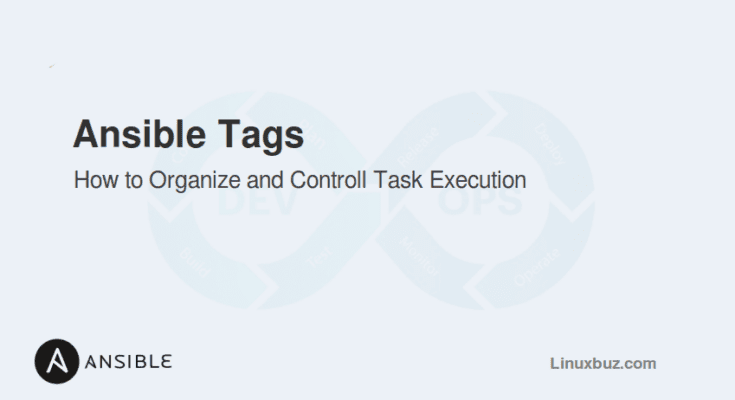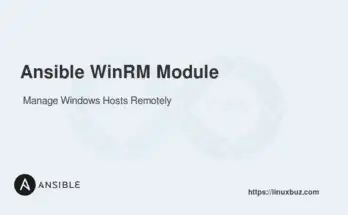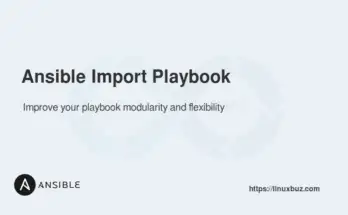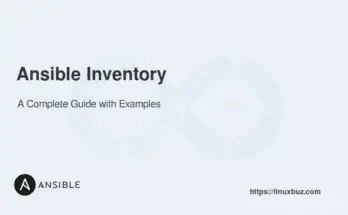Playbooks often include many tasks, some of which may not be necessary every time you run the playbook. Ansible tags provide a powerful way to manage which tasks run and which ones are skipped. By using tags, you can apply a fine-grained approach to controlling task execution.
Tags are particularly useful when:
- Execute only a subset of tasks in a playbook.
- Debug msg output to troubleshoot a specific case without running the entire playbook.
- Aim to improve efficiency by skipping irrelevant tasks.
In this blog, we’ll explore how to use tags in Ansible, illustrating how you can selectively apply tasks, skip others, and streamline your workflow.
Table of Contents
Adding Tags to Tasks
Tags are added to tasks using the tags keyword. You can assign one or multiple tags to a task.
Here is the example yaml playbook:
---
- name: Install and configure a web server
hosts: web
tasks:
- name: Install Apache
apt:
name: apache2
state: present
tags:
- install
- name: Start Apache service
service:
name: apache2
state: started
tags:
- configure
- name: Deploy website content
copy:
src: /var/www/html/index.html
dest: /var/www/html/index.html
tags:
- deployIn this case:
- install tag applies to the Apache installation task.
- configure tag applies to starting the Apache service.
- deploy tag applies to copying the website content.
To run tasks with specific tags, use the –tags option with the ansible-playbook command.
# ansible-playbook playbook.yml --tags "install,deploy"This will apply only to the tasks tagged as install and deploy.
Listing Tags
When working with large playbooks, it’s important to know which tags are available. You can list all tags in a playbook using the –list-tags option:
# ansible-playbook playbook.yml --list-tagsOutput:
playbook: playbook.yml
task tags:
- install
- configure
- deployThis command does not execute the playbook; it only displays the tags, helping you decide which tasks to include or exclude during execution.
Skipping Tasks with Tags
If you want to skip specific tasks, use the –skip-tags option:
# ansible-playbook playbook.yml --skip-tags "deploy"This skips tasks tagged with deploy while executing all other tasks.
Tagging Blocks
Tags can also be applied to blocks of tasks for conditional execution:
---
- name: Update and configure the system
hosts: all
tasks:
- block:
- name: Update apt cache
apt:
update_cache: yes
- name: Upgrade all packages
apt:
upgrade: dist
tags:
- system_updateBy tagging the block with system_update, you can run or skip the entire block based on your needs.
Using Tags with Include and Import Statements
Ansible allows you to include or import tasks, files, or roles dynamically. Tags can also be applied to these include/import statements, enabling selective execution.
Example: Tags with Include
- name: Deploy Webserver and Database Configuration
hosts: web
tasks:
- name: Include webserver tasks
include_tasks: webserver.yml
tags:
- webserver
- name: Include database tasks
include_tasks: database.yml
tags:
- databaseTo run only the webserver tasks:
# ansible-playbook site.yml --tags "webserver"This approach is particularly useful for breaking down large playbooks into smaller, manageable files. You can then use tags to control which set of tasks to execute.
Using Always and Never Tags
1. Always Tag
The always tag ensures that a task is executed regardless of other specified tags. This is useful for critical tasks, such as ensuring connectivity or running cleanup commands.
---
- name: Ensure a directory exists
file:
path: /var/log/myapp
state: directory
tags:
- alwaysEven if you run a playbook with a different set of tags, tasks with the always tag will still execute:
# ansible-playbook playbook.yml --tags "deploy"Tasks tagged with always will execute in addition to the deploy tasks.
2. Never Tag
The never tag ensures that a task is never executed, regardless of other specified tags. It is typically used for testing or when you want to temporarily disable a task.
---
- name: Test task (disabled)
debug:
msg: "This task should never run"
tags:
- neverEven if you attempt to include this task explicitly, it will not execute:
# ansible-playbook playbook.yml --tags "never"Conclusion
Ansible tags are a powerful way to organize and control task execution in your playbooks. They enable selective execution, making playbooks more flexible and efficient. By understanding and applying tags effectively, you can streamline your automation workflows, reduce execution time, and improve debugging.
FAQs
1. What happens if no tags are specified when running a playbook?
If no tags are specified, Ansible executes all tasks in the playbook by default.
2. Can I combine --tags and --skip-tags in a single command?
Yes, you can combine them to specify tasks to include and exclude in the same playbook execution.
3. Can I exclude tasks tagged with always?
No, tasks with the always tag cannot be skipped, as they are designed to run regardless of other tags.




